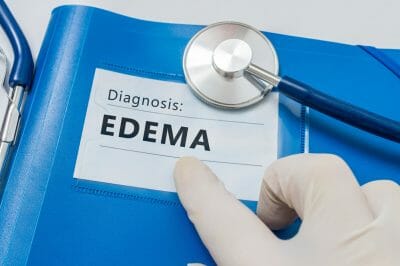Edema is something that can happen when your capillaries, which are tiny blood vessels, leak fluid. The fluid will build up in the tissues around it, and that leads to swelling.
There is a wide range of reasons edema can occur, ranging from something as simple as eating too many salty foods to being a symptom of congestive heart failure.
Below, we go into more detail about what edema is and some of the most common potential causes.
The Basics of Edema
As mentioned, edema is swelling that comes from too much fluid being trapped in bodily tissues, especially the skin.
There are different types of edema. For example, pulmonary edema affects the lungs. Pedal edema is in the feet. The places it most commonly occurs are the hands, arms, legs, ankles, and feet, but it can also affect the bowels, lungs, eyes, brain, and muscles.
Most of the people who experience edema are older or pregnant, but it can happen to anyone.
Symptoms, along with swelling and tightness, can include pain, stretched, shiny skin, and skin that keeps a dimple after a few seconds of putting pressure on it.
Other edema symptoms can include weight loss or weight gain, stiff joints, and a decreased production of urine.
The Most Common Causes of Edema
Some of the more common reasons that a person might experience edema include:
- Heart failure is when one or both lower chambers of your heart can’t pump blood properly. When someone has heart failure, their blood can accumulate in their limbs, causing edema.
- Kidney damage or disease can lead to edema. If someone has a kidney disorder, their body might not be able to eliminate enough sodium and fluid from their blood, putting pressure on blood vessels and causing fluid to leak out. With kidney problems, edema most often occurs around the eyes and legs. Damage to the capillaries that the kidneys use for filtering waste and excess fluids from the blood can lead to nephrotic syndrome. A symptom of nephrotic syndrome is low protein albumin levels in the blood, leading to edema.
- If someone has problems with their liver function or liver disease, it can cause edema, especially in the legs and abdominal cavity. For example, cirrhosis is a condition affecting liver function that leads to changes in how your body secretes hormones and chemicals that regulate fluids and protein production. This can cause fluid to leak out of blood vessels and into the surrounding tissue.
- Pregnancy is one of the most frequently seen reasons for edema. During pregnancy, your body will release hormones encouraging fluid retention. The body will also retain more sodium and water than typical, so which can lead to swelling in the face and hands, lower limbs, and feet.
- Some medications raise the risk of developing edema, including vasodilators, which open up blood vessels. Calcium channel blockers, estrogens, NSAIDS, certain diabetes drugs, and some types of chemotherapy drugs are also linked to a higher risk of edema.
- Complications of diabetes can be linked to edema. For example, diabetic complications can include acute liver or renal failure, protein-losing enteropathy, and cardiovascular disease, all of which can lead to edema.
- Your diet can put you at a greater risk of edema. If you consume too much salt, you’re suffering from malnutrition, or you have a low intake of B vitamins, you could develop edema.
- Extremity-related issues like a blood clot, varicose veins, a cyst, tumor or growth, or lymphedema are all possible reasons for edema.
Along with the causes above, there are a lot of other reasons for edema, like high altitude, inflammation or infection, menstruation and pre-menstruation, the use of birth control pills, and thyroid disease.
Complications can occur with edema, including swelling that becomes very painful, problems walking and stiffness, and infections in the swollen area. Edema can lead to skin ulcers, poor blood circulation, and scarring between the tissue layers.
Treating Edema
The treatment for edema can depend on the underlying cause. For example, if edema is occurring because of chronic heart failure, a provider might recommend making certain lifestyle changes like having less salt. If the edema is occurring because of a medication, your healthcare provider might recommend you lower the dose or stop taking the medicine.
There are also things you can do lifestyle-wise that may help with edema, like making sure you get up for short walks regularly rather than sitting for long periods, wearing support socks, and putting a pillow under your legs when you’re lying down to keep them elevated.
